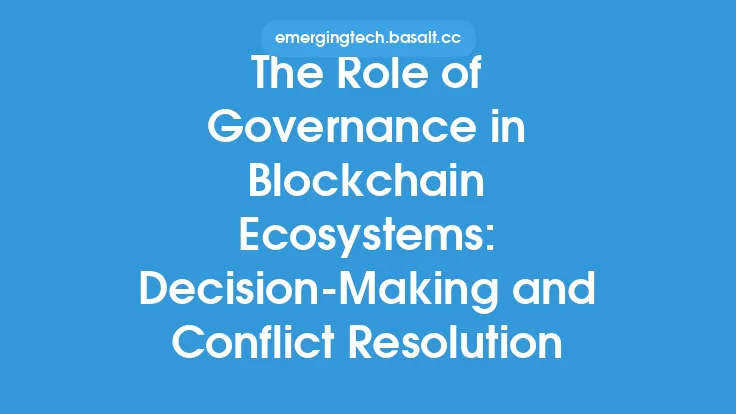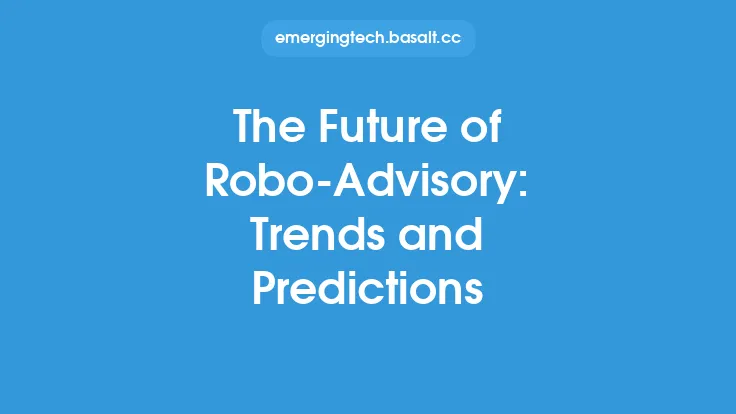The concept of blockchain governance has evolved significantly over the years, with various models and frameworks emerging to address the unique challenges and opportunities presented by this technology. As the blockchain ecosystem continues to grow and mature, it is essential to examine the future of blockchain governance, including emerging trends and challenges that will shape the industry in the years to come.
Emerging Trends in Blockchain Governance
One of the most significant trends in blockchain governance is the increasing adoption of decentralized governance models, such as Decentralized Autonomous Organizations (DAOs). These models enable community-driven decision-making, allowing stakeholders to participate in the governance process and ensuring that the network is managed in a fair and transparent manner. Another trend is the use of artificial intelligence (AI) and machine learning (ML) in blockchain governance, which can help automate decision-making processes, improve security, and enhance the overall efficiency of the network.
Challenges in Blockchain Governance
Despite the potential benefits of blockchain governance, there are several challenges that must be addressed. One of the primary challenges is scalability, as many blockchain networks struggle to handle a large volume of transactions and users. This can lead to network congestion, increased transaction fees, and reduced usability. Another challenge is regulatory compliance, as blockchain networks must navigate a complex and evolving regulatory landscape. This can be particularly challenging for decentralized networks, which may not have a clear jurisdiction or regulatory framework.
The Role of Tokenomics in Blockchain Governance
Tokenomics plays a crucial role in blockchain governance, as it enables the creation of incentivized systems that reward stakeholders for participating in the network. Tokenomics can be used to create a variety of governance models, including proof-of-stake (PoS) and delegated proof-of-stake (DPoS) consensus algorithms. These models enable stakeholders to participate in the validation process, ensuring that the network is secure and decentralized. Additionally, tokenomics can be used to create governance tokens, which enable stakeholders to participate in decision-making processes and shape the future of the network.
The Importance of Interoperability in Blockchain Governance
Interoperability is essential for the future of blockchain governance, as it enables different networks to communicate and interact with each other seamlessly. This can be achieved through the use of interoperability protocols, such as Cosmos and Polkadot, which enable the creation of interconnected blockchain networks. Interoperability is critical for the widespread adoption of blockchain technology, as it enables the creation of a unified and cohesive ecosystem. Additionally, interoperability can help to address the challenge of scalability, as it enables networks to share resources and handle a larger volume of transactions.
The Future of Blockchain Governance
The future of blockchain governance is likely to be shaped by a variety of factors, including emerging trends and challenges. One of the most significant factors is the increasing adoption of decentralized governance models, which will enable community-driven decision-making and ensure that networks are managed in a fair and transparent manner. Another factor is the use of AI and ML in blockchain governance, which will help to automate decision-making processes and improve the overall efficiency of the network. Additionally, the development of interoperability protocols will enable the creation of a unified and cohesive ecosystem, which will be essential for the widespread adoption of blockchain technology.
Conclusion
In conclusion, the future of blockchain governance is complex and multifaceted, with a variety of emerging trends and challenges that will shape the industry in the years to come. Decentralized governance models, AI and ML, tokenomics, and interoperability will all play a crucial role in shaping the future of blockchain governance. As the blockchain ecosystem continues to evolve and mature, it is essential to address the challenges and opportunities presented by this technology, ensuring that the benefits of blockchain governance are realized and that the industry continues to grow and thrive. By examining the emerging trends and challenges in blockchain governance, we can gain a deeper understanding of the future of this technology and the role that it will play in shaping the world of tomorrow.





